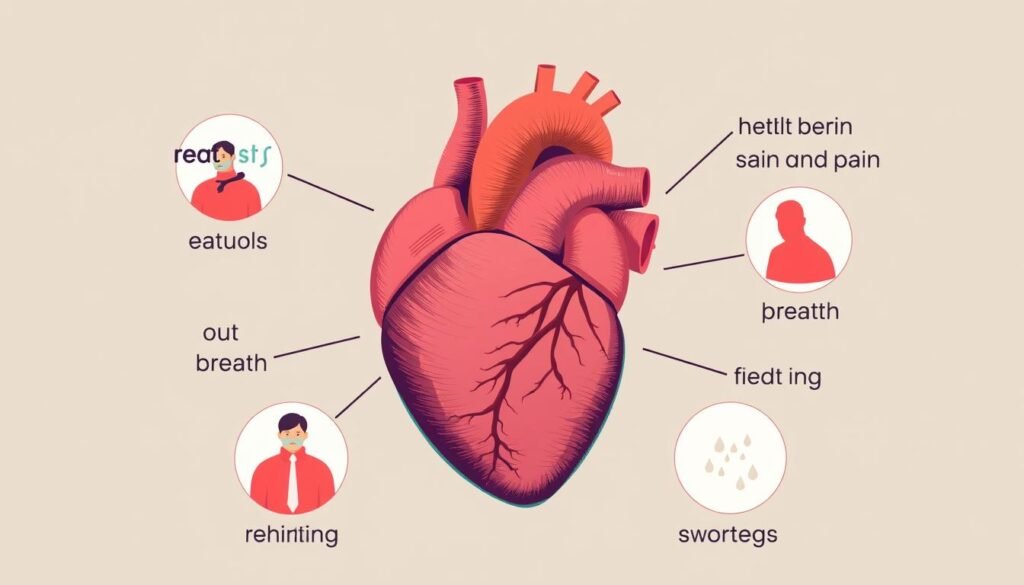Did you know nearly half of those who rush to the emergency room for chest pain have no heart problem? In fact, 30-40% find out their pain comes from anxiety. With more people facing anxiety disorders, it’s critical to tell apart anxiety-induced pain from real heart problems. This knowledge helps manage mental health better.
Anxiety can cause chest pressure and make your heart beat faster, mimicking heart problems. This often leads to unnecessary stress about one’s health. Recognizing these signs is crucial. It helps to reduce fear and ensure serious heart issues aren’t ignored. Understanding how anxiety affects the body helps us find ways to improve our mental health. This makes for a healthier, more balanced life.
Key Takeaways
- Anxiety can be a common cause of chest pain, affecting many individuals.
- Recognizing the symptoms can lead to better management of mental health.
- Anxiety heart pain often presents differently than heart attack symptoms.
- Research shows a significant overlap between anxiety and heart-related conditions.
- Emergency medical care is essential when experiencing chest pain for the first time.
- A deeper understanding of these symptoms can help alleviate unnecessary fears.
Understanding Anxiety: What It Is and How It Affects the Body
Anxiety is a common reaction to stress or future worries. It’s a typical mental health issue, impacting many people worldwide. About 1 to 4 out of every 100 people might experience panic disorder. This disorder starts the fight-or-flight response, causing physical symptoms of anxiety like a fast heartbeat and high blood pressure.
Chest pain often occurs during anxiety, appearing in 20% to 70% of panic attacks. Many folks go to the emergency room with chest pain but find out it’s not their heart. Instead, 18% to 25% learn they have panic disorder.
Lasting anxiety can harm both mental and overall health. Generalized Anxiety Disorder (GAD) impacts about 3% of U.S. adults. It makes other health issues more likely. Treatments like SSRIs and benzodiazepines help manage panic attacks. Techniques such as deep breathing, cognitive behavioral therapy (CBT), and life changes also ease anxiety’s physical effects.
It’s crucial to know how anxiety and physical health affect each other. Understanding anxiety’s physical signs helps people get the right help. It encourages steps toward getting better.
Common Symptoms of Anxiety Heart Pain
Anxiety shows up in many ways that may seem like heart issues. It’s key to know the difference between anxiety symptoms and real heart problems. Studies show that 58% of chest pain from anxiety is not heart-related. It comes from anxiety or panic attacks. Knowing the symptoms tied to anxiety is the first step in handling it well.
Physical Manifestations of Anxiety
One common sign of anxiety is chest tightness. People might feel stabbing chest pain. This pain usually hits the center or left side of the chest. Unlike heart attack pain, which spreads to shoulders or arms, anxiety chest pain is brief and sharp. Heart palpitations can come on fast during stress, like speaking in public or job interviews. These anxiety symptoms can include:
- Sharp or stabbing chest pain
- Tingling or burning sensations in the hands and fingers
- Feeling of breathlessness or tightness
Emotional Responses to Stress
Anxiety often triggers strong emotional responses. People might feel doom or heavy worry. In high-stress times, the body releases cortisol and adrenaline. These emotional reactions are linked to heart palpitations and chest tightness. Understanding this link helps in recognizing anxiety signs.
Understanding these symptoms is crucial for diagnosis and treatment. If you have these symptoms, getting help is important. Methods like relaxation, watching caffeine, and exercising can help manage anxiety.
Learn more about the connection between anxiety and chest pain.
What Causes Anxiety-Related Chest Pain?
Anxiety affects the body in many ways, including causing chest tightness. It’s helpful to know why this happens to ease concerns. Often, anxiety activates our fight-or-flight mode. This is our body’s way to respond to danger. When stressed, our brain releases hormones like adrenaline and cortisol. These make our hearts beat faster and our blood pressure rise. Such changes help us face threats but can also make our chest feel tight. Some might even think it’s a heart problem.
The Fight-or-Flight Response
This automatic reaction occurs when we’re stressed. Anxiety makes our body get ready to take action. This leads to:
- Increased heart rate
- Elevated blood pressure
- Heightened alertness
The body’s reaction might cause panic attack symptoms. This can make people feel very anxious and sometimes, they hurry to the ER if they have chest pain. It’s important to know these feelings often come from anxiety, not heart issues.
The Role of Adrenaline and Cortisol
Adrenaline and cortisol surge to help us deal with stress. These hormones lead to physical changes that can be scary. The chest tightness might feel like a heart attack because the symptoms can be similar. Knowing the signs of panic attacks can ease worries for those with anxiety. Using methods like deep breathing, meditation, or exercise can help. They address the mental and physical sides of anxiety-related chest pain.
Recognizing the Signs of a Panic Attack
Panic attacks happen suddenly and scary. You may feel your heart race and find it hard to breathe. Knowing these signs helps tell them apart from heart issues.
Symptoms of Panic Attacks
A panic attack can last a few minutes or up to an hour. Your body may react strongly. Symptoms include:
- Pounding or racing heart
- Chest tightness
- Breathing difficulties
- Nausea and sweating
- Trembling
Some people might get these symptoms now and then. But, for others, they come back often. This can lead to panic disorder.
How Panic Attacks Trigger Chest Pain
When scared, your heart rate can jump up, sometimes hitting 200 beats per minute. This can make your chest hurt.
But, this pain usually stays in the chest. It’s sharp, unlike the crushing pain of heart attacks.
Knowing panic attack signs is key, especially if you often feel anxious. Stress and the way symptoms change can help manage anxiety. For more on heart vs. panic attacks, visit this resource.
The Difference Between Anxiety Heart Pain and a Heart Attack
It’s important to know the difference between anxiety heart pain and a heart attack. Both can feel similar, but they have key differences.
Shared Symptoms: The Overlap
It can be tricky to tell the difference because anxiety and heart attacks have common symptoms. These include chest pain, shortness of breath, and more.
- Chest pain or pressure
- Shortness of breath
- Cold sweat
- Nausea
- Lightheadedness
A feeling of doom is common in both. Panic attacks often cause sharp pain. But heart attacks usually involve a constant pressure that might spread to arms or jaw.
Key Differences to Look For
Knowing the differences can save lives. Here are some things to watch for when you have chest pain:
| Feature | Anxiety Heart Pain | Heart Attack |
|---|---|---|
| Pain Type | Sharp or stabbing | Pressure or squeezing |
| Duration | Minutes to an hour | Ongoing, worsens over time |
| Radiating Pain | Rarely | Often to arm, jaw, or back |
| Trigger | Can occur anytime, often unexpected | Often follows physical exertion |
| Severity | Typically not life-threatening | Life-threatening, requires immediate care |
Chest tightness and a rapid heartbeat are common in both. Panic attacks usually end quickly. But heart attack symptoms get worse and last longer. If sudden, severe chest pain or anxiety chest pressure lasts more than a few minutes, get medical help right away.
When to Seek Medical Attention for Chest Pain
It’s important to know when chest pain needs medical attention. Every year, about 7.6 million Americans go to the emergency room for chest pain. This shows how common and serious it is. Look out for these urgent symptoms:
- Difficulty breathing
- Confusion
- Excessive sweating
- Nausea
- Dizziness
- Pain in the jaw, left arm, or back
- Feelings of pressure or tightness
If you have any heart attack symptoms, you should get help right away. Calling 911 quickly leads to fast diagnosis and treatment. This means tests like ECGs can be done even before you reach the hospital.

At the ER, doctors may run tests like ECGs, blood work, chest X-rays, and stress tests. Depending on what they find, treatment might include medicines, such as aspirin and blood thinners. In some cases, more direct actions like angioplasty or bypass surgery are needed.
After leaving the hospital, it’s crucial to see a regular doctor for ongoing care. This helps ensure good health in the long run.
Stress management is key to keeping your heart healthy too. Knowing when to seek help for chest pain symptoms can save lives. Acting fast in these situations is critical.
Coping Strategies for Managing Anxiety and Related Chest Pain
Effective coping strategies are key to managing anxiety and chest pain. These methods improve mental health and ease distress symptoms, such as breathing troubles. Many people find relief in different practices that boost their well-being.
Breathing Exercises and Mindfulness
Breathing exercises are essential for easing anxiety. Box breathing and pursed lip breathing help relax and lessen anxiety. They regulate breath, slow heart rates, and enhance mental health. Mindfulness meditation helps people stay in the present, easing anxiety and its physical effects.
Stress Management Techniques
Using stress management techniques daily can boost mental health. Regular exercise raises endorphins and supports heart health, reducing anxiety symptoms. Keeping a journal aids in processing thoughts and feelings, decreasing anxiety and chest pain. Getting enough sleep and consulting mental health professionals offer tailored plans for individuals’ needs.
Anxiety Disorders: Understanding the Connection to Chest Pain
Anxiety disorders affect millions around the world. They link closely to physical problems, especially chest pain. People with anxiety might feel symptoms similar to serious health issues. Understanding these disorders and their effects is key to managing them well.
Different Types of Anxiety Disorders
Anxiety shows up in several ways, including:
- Generalized Anxiety Disorder (GAD): This means worrying a lot about daily things.
- Panic Disorder: This disorder causes sudden panic attacks and fear of more attacks.
- Social Anxiety Disorder: This is having a big fear of social situations.
- Specific Phobias: This is being scared of certain things or situations.
These disorders can cause physical symptoms like chest pain. Anxiety’s stress can make your body react with fight-or-flight responses. This often feels very uncomfortable.
The Impact of Chronic Anxiety on Physical Health
Chronic anxiety harms physical health in several ways. People with anxiety often have:
- A faster heart rate
- Chest muscle tension
- Rapid, shallow breaths or hyperventilation
- A high sensitivity to pain
- Higher blood pressure
This can make chest pain feel worse. It might even seem like a heart problem. Understanding that anxiety might be the cause is important. Knowing how anxiety and physical symptoms like chest pain connect can help people seek the right help.

Anxiety Heart Pain: Treatment Options and Remedies
Managing anxiety heart pain means looking at many treatment possibilities. Finding the right plan is key for reducing symptoms and improving health. Mixing therapies and changes in lifestyle usually helps a lot.
Therapies for Anxiety Disorders
Cognitive Behavioral Therapy (CBT) is a top choice for anxiety disorders, including heart pain. It helps change bad thought patterns into better coping ways. Doctors might also suggest medicines, like antidepressants or anti-anxiety drugs, based on how severe the symptoms are. Adding mindfulness and stress relief practices can make a big difference in lowering anxiety.
There are also other treatments like:
- Talk therapy
- Exposure therapy
- Acceptance and Commitment Therapy (ACT)
Importance of Professional Help
Getting help from a professional is crucial for anyone with anxiety heart pain. A healthcare provider can figure out the problem and suggest the best treatments. Overlooking ongoing anxiety can lead to bigger health issues. That’s why it’s so important to seek help without delay. Experts have the know-how to give personalized advice.
Preventive Measures and Healthy Lifestyle Choices
Making healthy lifestyle choices is key to handling anxiety and its physical signs, like chest pain. By exercising regularly and eating balanced meals, your mental health improves. Strong social support also plays a big part in preventing anxiety episodes, especially those that show up as physical symptoms.
Importance of Exercise and Nutrition
Exercise is important for beating anxiety and keeping your heart healthy. People who work out often are less likely to get heart disease. Sadly, less than half of all adults do enough aerobic exercise. This lack of activity has raised anxiety levels for many. Aiming for at least 150 minutes of moderate exercise weekly can cut down anxiety and heart disease risks.
Eating right helps your body and mind stay clear. A diet full of vegetables, fruits, whole grains, and lean proteins can ease anxiety. Those who eat healthily tend to see a drop in their anxiety symptoms. These good habits make you both physically and emotionally stable.
Building a Support System
Having strong social ties can greatly lower anxiety’s impact. A support network encourages healthy habits and gives emotional support in tough times. Friends and family can push you to work out, help with meal plans, and join you in group exercises. Strong relationships help in handling stress and keeping up with healthy choices.
It’s important to use stress management techniques like relaxation exercises. Join community programs or group support for a positive atmosphere. This helps with physical and mental health. For more details on anxiety and physical symptoms, click here.

Conclusion
The connection between anxiety, heart pain, and its physical effects is key to managing mental health. Knowing the signs of anxiety helps not just with reducing discomfort. It’s also crucial for overall health. Almost 15% of people face severe anxiety, with many reporting chest pain.
Learning to manage stress can help people avoid panic attacks, which often come with chest pain. This allows for better handling of anxiety symptoms.
It’s important to take chest pain seriously. Doctors can offer vital help and treatments. Sadly, 25% of those with severe anxiety don’t get the medical help they need. Seeing a doctor ensures proper mental and physical health care is received. This approach leads to better health outcomes.
Raising awareness about anxiety disorders is important. It helps with better coping strategies and health care. By focusing on mental health, people can work towards a balanced life. This improves their overall health and helps them deal with anxiety and heart pain better.